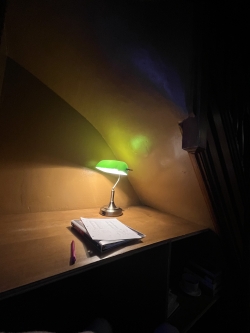
Combining Data and Imagination in Historical Linguistics (LING 27)!
By the time I graduate this June, Prof. Pulju will be the professor I've taken more classes with at Dartmouth than anyone else. I took LING 23: Semantics and Pragmatics with him my first winter, followed by LING 18: History of English my junior fall. This winter, I'm taking LING 27: Historical Linguistics with Prof. Pulju, and in the spring, I'll be in his major-culminating seminar, LING 80.10: Indo-European Linguistics. LING 27 is a prerequisite for this particular LING 80 topic, but I've been wanting to take it since I first got to Dartmouth anyway, so I had no hesitation about signing up for it!
Prof. Pulju is so much fun to listen to in class because he's clearly very passionate about linguistics, but also because he's incredibly funny to the point where a Facebook group was created by students (back in 2005!) to compile his quotes from nearly decades, at this point, of classes. His humor even transferred to the Zoom classroom I first met him in during winter 2021 (Semantics and Pragmatics was virtual)!
That being said, of all those classes, LING 27 is by far my favorite class I've taken with Prof. Pulju so far because I'm frankly enamored with the material. I first fell in love with linguistics as a competitor in the Scripps National Spelling Bee in middle school, particularly because of everything there was to know about how words got to be the way they are now (and will continue to change and become different in the future), and in many ways, historical linguistics boils down to just that! Furthermore, in Introductory Linguistics at Dartmouth, my very favorite unit was historical linguistics—the problem sets just felt like doing logic puzzles with language, and I've loved logic puzzles since childhood.

Our most recent problem set was based on a data set of imaginary words in two different languages. Our task was to figure out which words had been borrowed from which language based on the phonological evidence provided by the sound changes. Once we'd done that, we were also asked, with nothing but the data itself, to imagine what speaker contact between these two groups might've looked like, which group had more sociopolitical power, and the cultural factors that influenced the establishment of that power. A classmate of mine referred to it as "writing a fanfiction from a data set," and that's kind of how it felt!
I usually think of data-based problem sets as methodical, if not mathematical (LING 27 is a quantitative/deductive sciences credit!), and this one was no exception. However, the added dimension of using imagination to bring the data and the people behind it to life embodies what I love so much about linguistics. It's genuinely interdisciplinary and employs logical approaches to tell dramatic (but true!) stories that stretch over more time and space than any one human can properly fathom. It's only week five right now, so there's plenty of LING 27 left in store—we'll see where else it takes me!
















